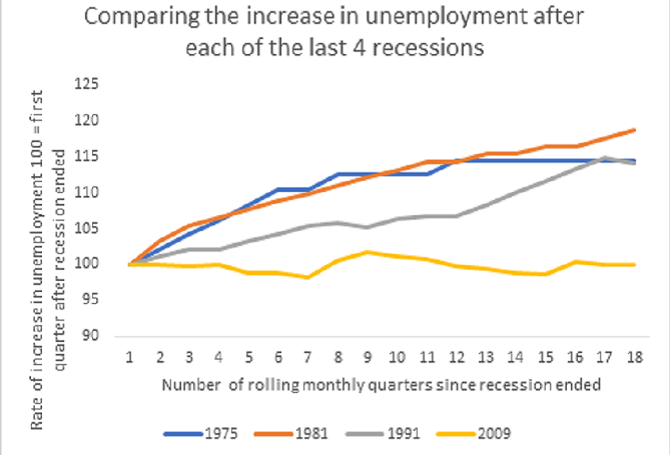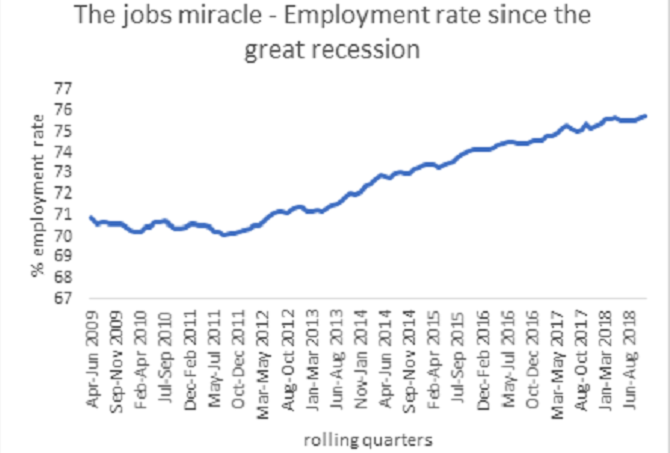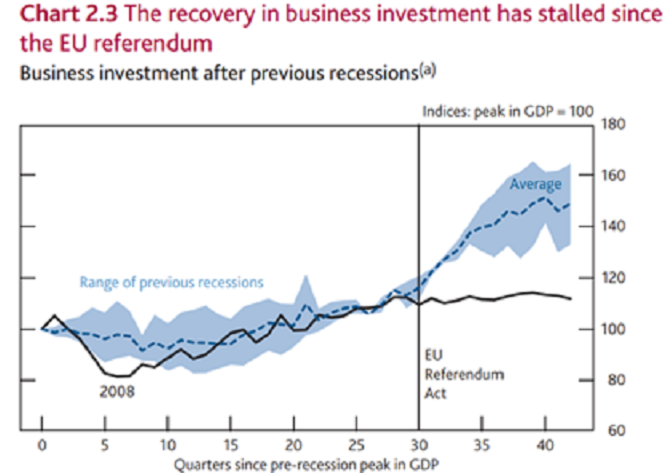
Recruitment and redundancy outlook
Stay up to date with the latest recruitment and redundancy trends in the UK.
Employment is up but productivity isn’t – Jon Boys makes sense of what’s happening in the UK labour market and asks whether Brexit is to blame
The ONS’ latest labour market statistics are promising:
The CIPD’s latest Labour Market Outlook agrees with these impressive numbers, showing that employers expect to increase their workforce in the first quarter of 2019. And yet, despite these good news stories, few would describe the national mood as optimistic. Perhaps that is because interspersed between these golden headlines are stories like this:

So, Is the UK labour market a good news story or not?
After the financial crash, policymakers were braced for a sharp increase in unemployment, but unlike in previous recessions, it remained muted.
At the same time, employment steadily rose as part of a ‘jobs miracle’ that has continued to this day. High unemployment is not nice. There are economic and social consequences which for individuals can be long term, so the jobs miracle was unequivocally a win for the UK. Despite anxiety around insecure forms of working, much of the increase in employment has been made by full-time roles.
But every rose has its thorn. Before we talk about Brexit (and we will talk about Brexit) we should give some consideration to productivity. Like unemployment, low productivity is an economic bogeyman. However, whilst unemployment is ephemeral dissipating as the business cycle picks up, stagnant productivity has become entrenched.

Productivity is the engine that drives the economy forward. It is how businesses combine inputs in the production process and is therefore a measure of efficiency. More efficient businesses can afford to pay more and so productivity drives improvements in pay and living standards. It is no exaggeration to suggest that low productivity is the most pressing economic problem of our time.
The Bank of England has suggested that since the EU referendum business investment has stalled, reflecting the uncertainty of Brexit. This is important because investment in things like plants and machinery can drive productivity growth. Gertjan Vlieghe, a member of the Bank of England’s Monetary Policy Committee that sets the Bank’s base rate, suggested in a speech in February that business may be substituting big investments for investing in people.
Buying specialised equipment is costly to reverse and so such decisions are put off in uncertain conditions whereas employment decisions are less costly to reverse. Businesses may be meeting demand by expanding their workforce instead of investing in technology to be more productive.

Sources: ONS and Bank calculations
(a) Chained volume measure. Recessions are defined as at least two consecutive quarters of negative GDP growth. Previous recessions include those beginning in 1973, 1975, 1980 and 1990. A recovery ends if a second recession occurs in the period shown.
The official figures from the ONS only take us up until the end of 2018, and the latest report from the CIPD covers the period up until the end of March: Brexit D-Day. Anecdotal and survey evidence suggests that recruitment started to deteriorate in January 2019. The recruitment planning horizon, especially for SMEs, is now past the Brexit deadline and some may be holding steady.
The implication for policymakers is obvious. Businesses are craving certainty and the lack of it is already starting to bite both in terms of investment and likely recruitment.
One of the biggest costs of Brexit has been the opportunity cost as businesses and government divert attention away from competing priorities. When the Brexit distraction goes away we will still be left with deep-seated structural impediments to growth such as struggling productivity, and it is here that employers may be able to make a real difference. We have talked about productivity as being how businesses combine inputs in the production process. In the impersonal language of economics, we might forget that those inputs include people even though labour is the largest cost for UK businesses.
It is therefore no wonder that a growing body of research, including a recent study by the ONS, has shed light on the important role of people management practices in boosting productivity. Getting the most out of your existing workforce is an attractive proposition, especially for firms reticent to hire in the face of uncertainty. Good people management is about having structured practices in place around such things as performance reviews, training and managing underperformance. The introduction of such practices can be particularly beneficial to SMEs.
The UK labour market has been a mixed bag, but the jobs miracle has been cause for celebration. To ensure it continues we should look long term, beyond Brexit, and work towards creating the conditions for long term prosperity. The people profession has a key role to play given the growing volume of research demonstrating the link between good people management and productivity.

Jon s an experienced labour market analyst with expertise in pay and conditions, education and skills, and productivity.
Jon used quantitative techniques to uncover insights in labour market data, both publicly available and generated through CIPD surveys.

Stay up to date with the latest recruitment and redundancy trends in the UK.



A manifesto for fair, skilled and innovative work, setting out CIPD’s recommendations for policy-makers to strengthen the Scottish labour market

Find out what people professionals said about their working lives and career development prospects in our recent pulse survey

As artificial intelligence continues its rapid advancement and becomes the much touted focus for investment and development, we highlight the critical role of the people profession and explain how the CIPD and its members will be involved shaping its impact at work

A look at whether artificial intelligence can cover skills shortages by exploring the benefits of AI and the advantages that can be gained by using generative AI such as ChatGPT

Jon Boys discusses the benefits of generative AI tools, and how organisations can utilise them